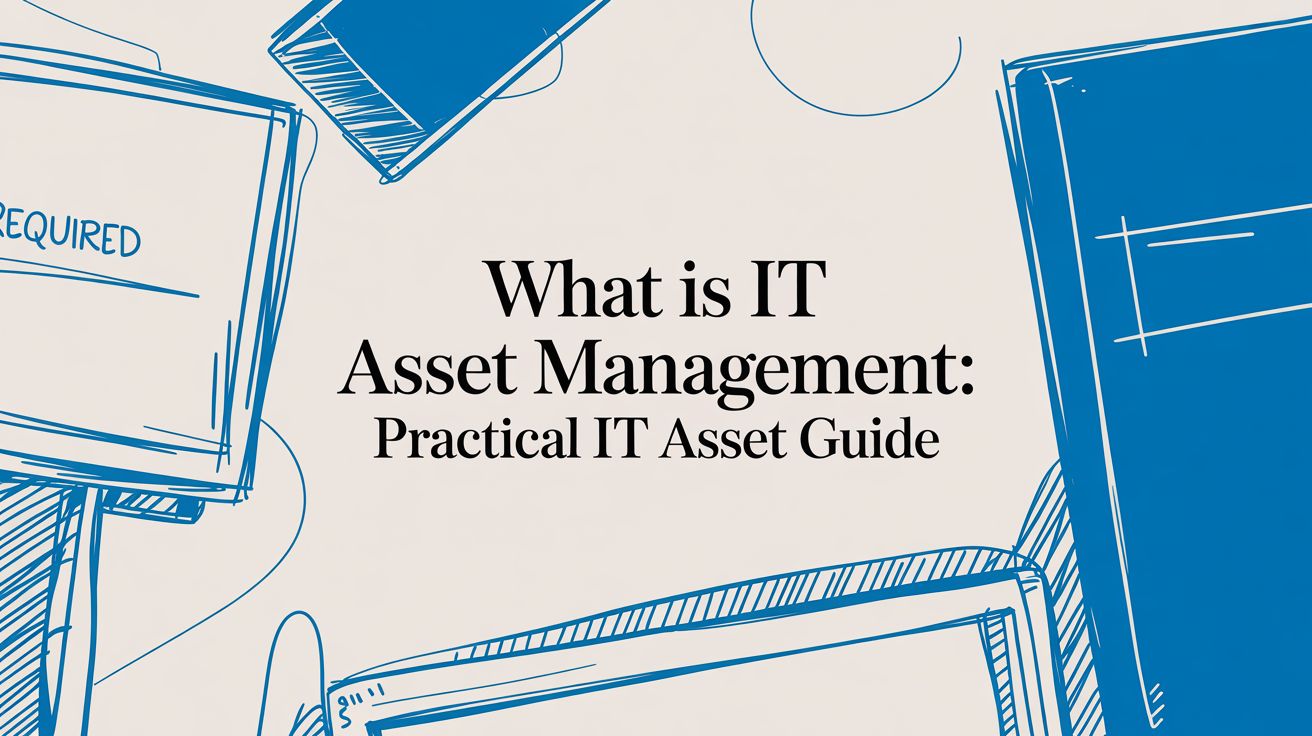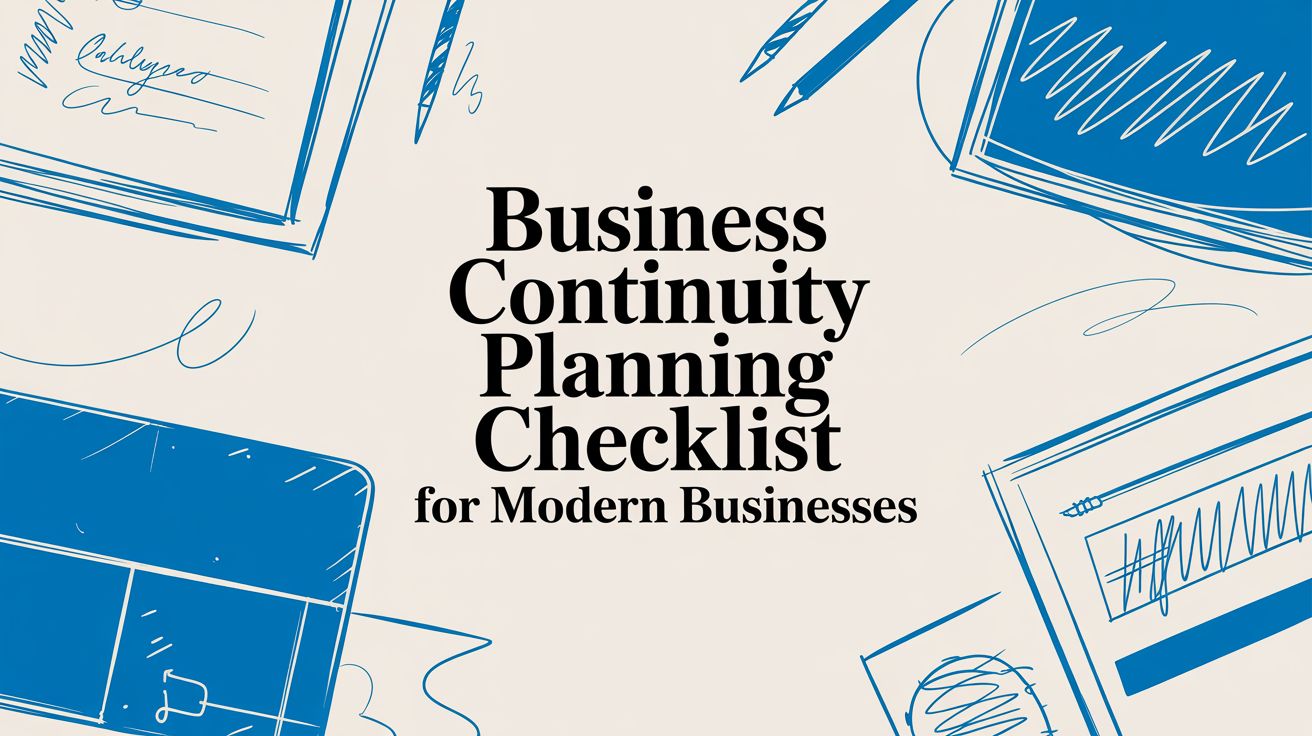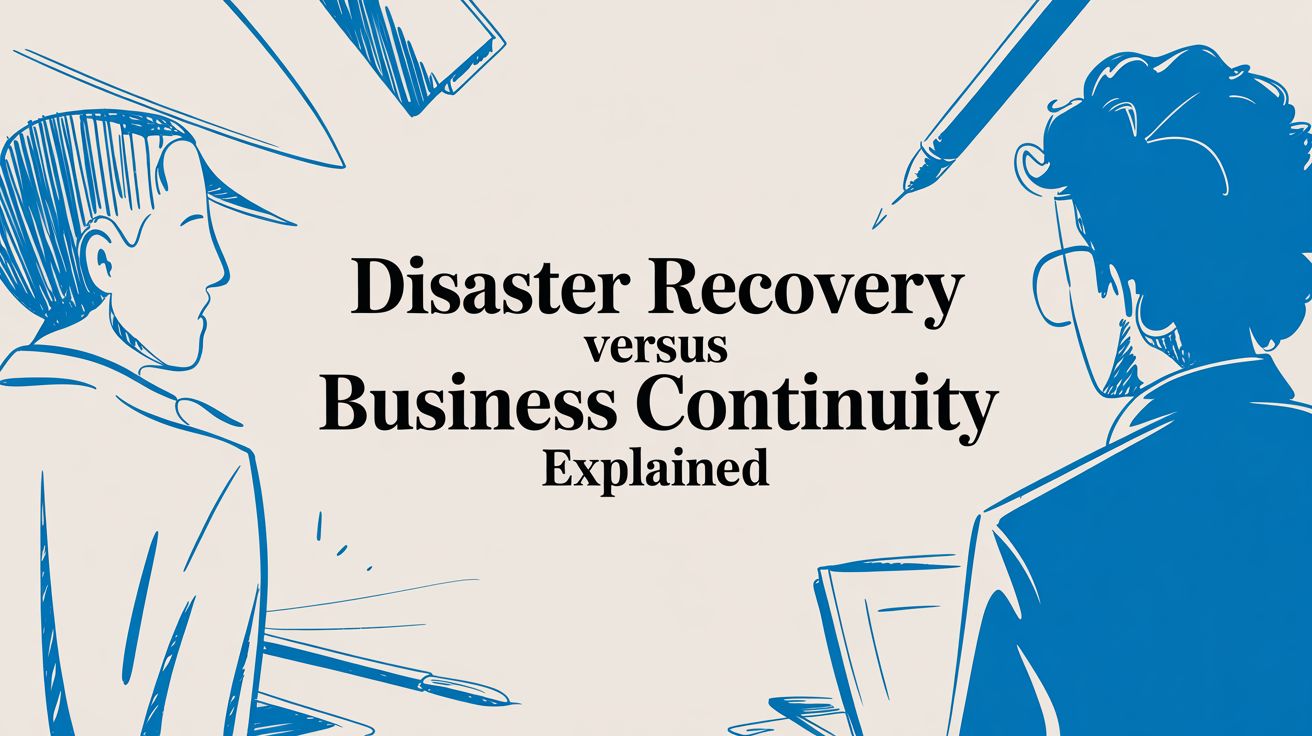Best Endpoint Protection for Small Business: A Managed Approach
When it comes to cybersecurity for your small business, the best defense is a managed solution that pairs advanced Endpoint Detection and Response (EDR) technology with round-the-clock human expertise. Let’s be clear: the off-the-shelf antivirus software you used to rely on just doesn't cut it anymore. To stand a chance against modern threats like ransomware and hyper-targeted phishing schemes, you need a proactive, managed defense.
Why Your Endpoints Are a Hacker's Favorite Target
Think about your business's security like protecting a physical building. Your firewall is the heavy-duty front gate—it's your first and most obvious line of defense. But what about all the other ways in? The windows, the side doors, the delivery entrances? In the digital world, every laptop, server, desktop, and smartphone your team uses is one of those access points. We call them "endpoints."
Hackers know that trying to break down the main gate is tough. It’s far easier to jiggle the handle on a side door or find an unlocked window. That’s precisely why your endpoints have become the real front line in your company's security. Each device is a potential doorway for an attack, allowing criminals to sidestep your main network defenses and get direct access to your company’s data.
This reality calls for a major shift in how we think about security. We have to move past the old-school idea of simple antivirus, which is a bit like a security guard who can only spot criminals from a static photo album. Today's threats are brand new, shapeshifting, and masterfully disguised to look harmless.
The Modern Threat Demands a Modern Defense
Modern endpoint protection is less like that passive guard and more like a vigilant, always-on security team. It doesn't just block what it already knows is bad; it actively hunts for suspicious behavior, analyzes patterns, and shuts down attacks before they can do any real damage.
The statistics tell a sobering story. A recent study revealed that a staggering 70% of all cyber breaches start with a compromised endpoint, making it the number one way attackers get in.
Today’s threats don’t just knock on the front door; they test every window and exploit any weakness. An unsecured laptop is just as dangerous as a weak firewall.
Great protection isn't just about the software—it’s about the speed and skill of the response. Before picking a solution, it’s worth understanding the core concepts laid out in this guide on What Is Endpoint Protection and Why Does It Matter?. It does a great job of breaking down how these tools secure your business from the ground up.
Real-World Example: A Dallas Accounting Firm
Picture this: a mid-sized accounting firm right here in Dallas. An employee working from home gets a very convincing phishing email disguised as an invoice from a known vendor. They click the link, and just like that, ransomware starts silently encrypting files on their laptop.
But because the firm had a managed endpoint solution from PWR Technologies, our system immediately flagged the unusual file activity. Within seconds, the compromised laptop was automatically quarantined from the network, stopping the ransomware dead in its tracks before it could spread to the company servers or other workstations. Our security team got an instant alert and neutralized the threat completely.
The business outcome? What could have been a catastrophic data breach, leading to days of downtime and significant financial loss, was contained to a minor hiccup on a single machine. The firm’s business continuity was preserved, client data remained secure, and their reputation was protected. This is a powerful lesson in why proactive defense is non-negotiable for business survival.
Traditional Antivirus vs. Modern Endpoint Protection
It’s easy to get confused between old-school antivirus and modern EDR, but the difference is night and day. Antivirus is reactive, while EDR is proactive. Here's a quick breakdown to see why yesterday's tools can't handle today's threats.
As you can see, EDR doesn't just check for known villains; it analyzes how programs and users behave to spot an attack as it's happening. This proactive, intelligent approach is the only way to effectively defend a modern business.
What to Look For in an Endpoint Security Solution
Trying to figure out endpoint protection can feel a bit overwhelming, with all the acronyms and tech-speak. But you don't need to be a cybersecurity guru to choose the right tools. The key is to cut through the marketing fluff and focus on the core features that actually stop threats.
Think of it this way: old-school security was like a padlock on the door. Modern endpoint protection is more like a high-tech security team that's always on patrol, actively looking for trouble. To find the right fit, it helps to research the best business antivirus software to get a feel for what top-tier solutions offer.
Next-Generation Antivirus (NGAV)
Let's be honest, traditional antivirus software just can't keep up anymore. Next-Generation Antivirus (NGAV) is a massive leap forward. It uses artificial intelligence and machine learning to hunt for suspicious behavior, not just known viruses from a database.
This is a huge deal because it means NGAV can spot and shut down zero-day threats—attacks that are brand-new and haven't been seen before. It’s the difference between reacting to a known problem and proactively stopping a new one in its tracks.
Endpoint Detection and Response (EDR)
If NGAV is your frontline guard, then Endpoint Detection and Response (EDR) is the detective team that investigates any suspicious activity. It works like a security camera for your entire network, constantly recording everything that happens on your devices—what files are accessed, what programs are run, and what connections are made.
This complete visibility is a game-changer. If a threat does slip through, your security team can instantly rewind the tape to understand exactly what happened: how the attacker got in, what they did, and how to make sure it never happens again. This is a critical component of not just defense, but also of a robust business continuity plan.
The infographic below shows just how many different devices connect to your network. Each one is a potential doorway for an attacker.
As you can see, a solid security plan has to cover everything—laptops, servers, and phones—to create a unified defense.
A Centralized Management Console
Keeping track of security is tough, especially with team members working from different locations. This is where a centralized management console comes in. It’s essentially a single dashboard that gives you a bird's-eye view of every single device on your network, no matter where it is.
Your IT partner should be able to see the security status of every endpoint in real-time, from a team member’s laptop in Memphis to your main server in Dallas. This centralized command center allows for instant policy updates, threat response, and compliance reporting.
Without this, you're stuck trying to manage security on a device-by-device basis, which is a recipe for disaster. This single pane of glass ensures every device is protected with the same rules and allows for lightning-fast responses when something goes wrong. Independent tests back this up; top-tier solutions like Sophos Intercept X and Microsoft Defender Antivirus have demonstrated 100% detection and protection rates in recent evaluations, stopping attacks cold with zero compromises.
The True Cost of a DIY Security Strategy
Many business owners I talk to think handling cybersecurity themselves is a great way to save a few bucks. On the surface, it makes sense. You buy a software subscription, install it on your computers, and you're good to go, right?
But this view misses the massive hidden costs lurking just beneath the surface. The reality is, a do-it-yourself security plan can quickly spiral into one of the most expensive mistakes a business can make.
The first cost that usually gets overlooked is time—specifically, the time your non-expert staff ends up wasting. When a security alert pops up, who deals with it? Too often, it’s the office manager or another employee who then spends hours down a rabbit hole, trying to figure out what the technical jargon means and if the threat is even real. Every minute they spend playing IT detective is a minute they aren’t doing their actual job, and that lost productivity adds up fast.

The Inefficiency of In-House Alert Management
Without dedicated security expertise, your team is essentially flying blind. It's incredibly easy to misconfigure endpoint protection software, leaving huge security holes wide open while giving you a false sense of safety.
Even worse is the problem of "alert fatigue." A constant barrage of minor notifications and false positives desensitizes your team. They start to ignore the pop-ups, and that’s exactly when they miss the one that signals a real, devastating attack.
This isn't a rare problem. A detailed cybersecurity report shows that while small business security spending is set to hit $109 billion by 2026, many are still way behind the curve. In fact, 29% of small businesses put less than 5% of their IT budget toward security, usually because they just don't have the in-house knowledge to justify more.
A Cautionary Tale: The Memphis Logistics Company
Let me tell you about a logistics company right here in Memphis. They were running their business on a basic, off-the-shelf antivirus program and thought they were covered. Then, one day, a very convincing phishing email slipped through. An employee clicked the link, and within hours, their entire shipping and scheduling system was frozen by ransomware.
The chaos was immediate. For three full days, their operations were dead in the water as they scrambled to restore from backups—a task that turned out to be far more complicated than they ever imagined.
The business impact was severe:
- Lost Revenue: Every hour they were down meant missed deliveries and angry clients.
- Recovery Expenses: They had to pay a premium for an emergency IT consultant to come in and sort out the mess.
- Reputational Damage: The delays frustrated their customers, and the trust they had built was seriously damaged.
In the end, the total cost of this single incident—when you factor in downtime, recovery fees, and lost business—was more than five times what a full year of professional, managed endpoint protection would have cost.
Their story is a powerful lesson. Expert security management isn't just another line item on your budget; it’s a crucial investment in your company's business continuity. When you let experts handle your defenses, you free up your team to focus on what they do best—growing the business.
How Managed Services Elevate Your Defenses
Having top-tier endpoint protection software is a fantastic start, but it's only half the equation. The real game-changer for your business’s security is having a team of experts at the controls 24/7. This is where partnering with a Managed IT Services Provider (MSP) like PWR Technologies makes all the difference.
Think of it like securing your office building. You could install the most sophisticated security cameras and alarm systems available. But who’s watching the live feed? And who's going to respond when an alarm blares at 3 a.m.? An MSP is that dedicated security team, providing the constant vigilance that software alone simply can't.

It’s like hiring an entire squad of elite security guards for less than the cost of a single in-house IT employee. You’re not just buying a software license; you're gaining access to a full-fledged Security Operations Center (SOC) that actively hunts for threats, handles all the updates, and responds the second an incident occurs.
Integrating Protection into a Layered Strategy
Smart cybersecurity isn't about finding one magic bullet product; it's about building multiple layers of defense that work together. The best endpoint protection for a small business is one that’s woven seamlessly into a bigger security picture. An MSP doesn’t just install an antivirus and call it a day—we make it part of a cohesive strategy.
This means your endpoint security works in tandem with other critical defenses, creating a unified shield around your entire operation.
- Managed Firewalls: We configure and watch your network’s perimeter, blocking malicious traffic long before it has a chance to reach your devices.
- Secure Data Backups: While endpoint protection is your frontline defense, we also make sure your critical data is backed up and can be restored quickly as part of a comprehensive disaster recovery plan.
- Continuous Monitoring: Our team uses advanced tools to keep an eye on your whole network, not just individual computers, to spot suspicious patterns that could signal a coordinated attack.
- Employee Security Training: Your people are a crucial layer of defense. We provide ongoing training to help your staff recognize and dodge phishing emails and other sneaky social engineering tactics.
By connecting all these pieces, an MSP ensures there are no gaps for attackers to slip through. Each layer reinforces the others, which drastically lowers your overall risk. You can learn more about how this holistic approach works by exploring our guide on what is managed security services.
Partnering with an MSP transforms your security from a collection of disjointed tools into a fully managed, cohesive defense system. This shift moves your business from a reactive stance to a proactive one, stopping threats before they cause damage.
The Tangible Business Outcomes of Managed Security
For a business owner, this level of protection delivers more than just technical fixes—it produces real, tangible business results. Instead of losing sleep over the latest cyber threat, you can get back to focusing on running and growing your company with genuine peace of mind.
To see how this works in practice, let's compare the DIY approach to a managed service model.
DIY vs. Managed Endpoint Protection
Ultimately, this comparison makes the choice clear. A managed service model turns cybersecurity from a source of stress and unpredictable expense into a strategic asset. You get enterprise-grade protection, predictable costs, and the priceless confidence that your business is secure, allowing you to move forward without constantly looking over your shoulder.
Finding the Right IT Partner for Your Business
Picking an IT partner is one of the biggest decisions you'll make for your company. This isn't just about finding someone to fix a misbehaving printer; it’s about trusting a team with the very core of your business operations and security.
A great partner acts like an extension of your own team. They bring the deep technical know-how and business foresight needed to protect your assets and help you grow without unnecessary risk. Finding that perfect fit means asking some tough questions that cut through the sales pitch and get to the heart of what they can actually do.
Essential Questions to Ask a Potential Provider
Before you even think about signing a contract, you need clear, confident answers to a few critical questions. Their responses (or lack thereof) will tell you everything you need to know about their capabilities and if they're the right match for your security.
- Process Under Pressure: "Walk me through your exact process when an EDR alert is triggered on a client's machine." A vague "we'll check it out" isn't good enough. A real pro will have a documented, rapid-response playbook ready to go.
- Local Expertise: "Can you share case studies or references from other businesses in the Dallas or Memphis area?" A provider with boots on the ground in your market understands the local business environment and its unique challenges.
- Proactive Strategy: "How do you stay ahead of new threats, and how does that work its way into the service you provide us?" You want to hear about continuous monitoring, threat hunting, and ongoing security training—not just reactive fixes.
These questions force a potential partner to demonstrate their competence, not just talk about it. You need a team that can prove its value from day one. To get a better feel for what a top-tier provider does behind the curtain, check out this guide on what Managed Service Providers do.
The Co-Managed IT Partnership Model
What if you already have an IT person or a small team on staff? You don't have to choose between their valuable institutional knowledge and the specialized expertise of a Managed Service Provider (MSP). This is where the co-managed IT model comes in.
This is not a replacement strategy; it's a partnership. We empower your existing IT staff with our enterprise-grade security tools, a 24/7 Security Operations Center, and a deep bench of specialists they can call on anytime.
Think of us as a force multiplier for your internal team. Your staff can keep handling the day-to-day user support and projects they know inside and out. Meanwhile, we back them up with advanced cybersecurity monitoring, critical patch management, and high-level strategic guidance.
This collaborative approach fills critical security gaps and elevates your in-house capabilities. It gives you comprehensive protection without the massive overhead of hiring an entire security department. It’s a smart, scalable way to secure your business while making the most of the team you already trust.
Building a Resilient Business, Not Just a Secure One
So, what's the big takeaway? Effective endpoint protection isn't just another piece of security software; it's a cornerstone of your business continuity plan. We've covered a lot of ground, but it all comes back to a simple truth: modern cyber threats demand a modern, managed solution. The old-school, DIY approach of installing a basic antivirus and hoping for the best is a gamble most growing businesses just can't afford to take.
Partnering with a dedicated IT expert like PWR gives your small business access to the same caliber of security that large corporations have, but at a price that makes sense. The goal completely shifts from just blocking attacks to building a truly resilient company—one that can take a hit, bounce back fast, and keep serving customers without skipping a beat. That’s the real difference between merely surviving a threat and actually thriving in spite of it.
More Than Defense—It’s a Business Enabler
When your endpoint security is managed properly, it stops being a headache and starts becoming a powerful tool for growth. Think about it: instead of your team burning valuable hours trying to figure out what a cryptic security alert means, they can stay focused on what they do best—innovating, serving clients, and pushing the business forward.
This proactive shield keeps your day-to-day operations stable and predictable. It slashes the risk of expensive downtime, safeguards the reputation you’ve worked so hard to build, and gives you the peace of mind to make bold business moves. Real security isn't about locking things down; it's about creating a safe environment where your business has the freedom to reach its full potential.
A secure business can focus on its mission. A resilient business can pursue its mission with confidence, knowing it's prepared to handle whatever comes next. This proactive stance is what separates market leaders from those who are merely getting by.
Take the First Step Toward True Resilience
It all starts with understanding your company's unique weak spots. A one-size-fits-all solution is never going to cut it because it can't account for your specific industry, your team's workflow, or any compliance rules you have to follow. This is exactly why a personalized strategy is non-negotiable.
We invite you to take the next step with a no-obligation security assessment from PWR Technologies. Our team will help you pinpoint potential gaps in your current defenses and lay out a clear, actionable plan to protect your business. Let's work together to build a secure and resilient future for your company in Dallas or Memphis, so you can keep running, no matter what.
Still Have Questions About Endpoint Protection?
It’s completely normal. The world of cybersecurity can be confusing, and it's smart to ask questions before you invest in protecting your business. We get a lot of the same queries from small business owners in Dallas and Memphis, so we've answered the most common ones right here.
Is the Free Antivirus on My Computer Really Enough for My Business?
That’s a great question. While tools like Microsoft Defender are a decent first line of defense, they’re really designed for personal use. They offer a basic shield against common, known viruses but fall short where it counts for a business.
Modern cyberattacks, especially sophisticated ransomware and brand-new "zero-day" threats, are designed to slip right past these basic tools. Business-grade security requires advanced Endpoint Detection and Response (EDR) capabilities backed by a team of experts watching over your systems 24/7. Your company’s data is just too valuable to rely on a free, consumer-grade solution.
What Does Managed Endpoint Protection Typically Cost?
The price usually depends on two things: how many devices you need to cover and the level of service you choose. A simple software license might look cheap upfront, but the real value comes from a fully managed service. This bundles the software with round-the-clock professional monitoring and, most importantly, incident response.
This approach turns security from a potentially catastrophic, unpredictable expense into a manageable, fixed operational cost.
A managed security service might run a few hundred dollars a month. Contrast that with the average cost of a data breach for a small business, which can easily hit six figures. The investment in proactive protection is a tiny fraction of what it costs to clean up after a successful attack.
What’s the Difference Between EDR and MDR?
This is a fantastic question that really gets to the core of what makes modern security work. Here’s a simple way to think about it:
- EDR (Endpoint Detection and Response) is like installing high-tech security cameras on every one of your computers and servers. It's the powerful tool that sees and records everything happening, flagging any suspicious activity.
- MDR (Managed Detection and Response) is the team of security guards watching those camera feeds 24/7/365. They're the experts who analyze the alerts, figure out if it's a real threat, and take immediate action to neutralize it before damage is done.
So, EDR is the technology, and MDR is the human expertise that makes that technology effective. You really need both to be properly protected.
How Long Does It Take to Get Set Up with Professional Endpoint Protection?
With an experienced IT partner, it's a lot faster and smoother than you might think. We start with a quick chat to understand your specific business needs. From there, we can deploy the protection software to all your endpoints—laptops, desktops, servers—remotely, often in just a few days.
Our team handles the entire setup, configuration, and testing process. We make sure you get protected quickly without any disruption to your team's workflow. The whole point is to take security off your plate, not add to it.
Ready to secure your business with the best endpoint protection for your small business? The team at PWR Technologies provides enterprise-grade security with the human touch you deserve. Contact us today for a no-obligation security assessment.




